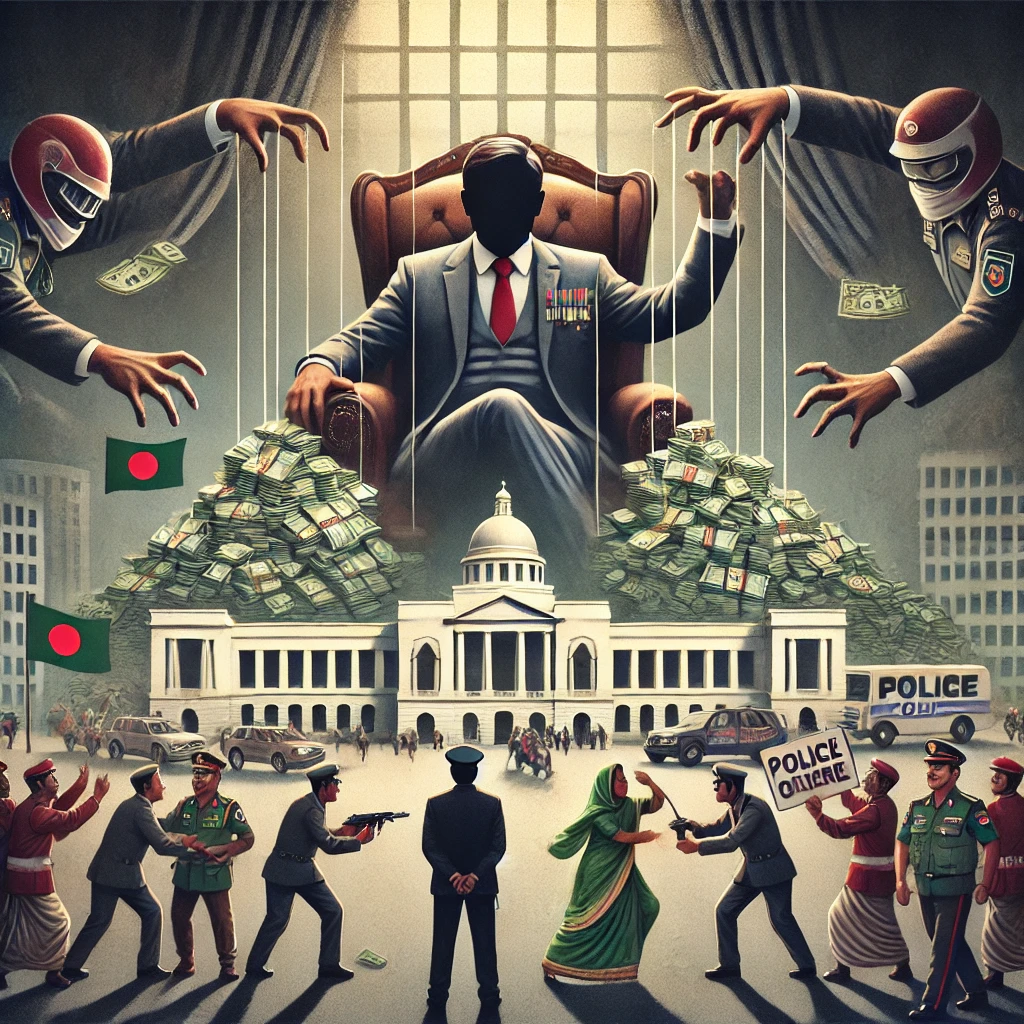
Corruption within Bangladesh’s public service has long been a major impediment to the nation’s development, undermining governance, economic growth, and public trust. While the resignation of Prime Minister Sheikh Hasina should have paved the way for genuine reform, the reality under the interim government led by Muhammad Yunus has been far from transformative. Instead of taking decisive action, the administration has failed to address the deeply entrenched corruption that continues to plague the civil service.
Prevalence of Corruption in Public Services: A Problem Ignored
A 2021 survey by Transparency International Bangladesh (TIB) revealed that approximately 70.9% of households encountered corruption when accessing public services. Law enforcement agencies, the Department of Immigration and Passports, and the Bangladesh Road Transport Authority were ranked as the most corrupt. Despite these damning statistics, the interim government has done little to root out corruption from these sectors.
The judiciary and health sectors also reported alarming corruption levels, yet the Yunus-led administration has prioritized superficial political optics over real reforms. The estimated BDT 108.3 billion (USD 1.14 billion) lost to bribery in 2021 should have been a wake-up call for the new government, but there has been no significant crackdown, no structural overhaul, and no justice for the millions of Bangladeshis suffering from this systemic rot.
Civil Service Recruitment: Corruption Persists Under a New Leadership
The civil service recruitment process has long been tainted by exam leaks and bribes, but instead of dismantling these corrupt networks, the interim government appears content with maintaining the status quo. A July 2024 report implicated several officials from the regulatory body responsible for recruitment, yet no real accountability measures have been implemented.
The failure to introduce transparent hiring policies suggests that the so-called “reformist” interim government is either unwilling or incapable of challenging the powerful bureaucratic elites who profit from corruption. Without a meritocratic recruitment system, the government is merely recycling the same corrupt figures who thrive under weak oversight.
The Political Turmoil: A Change in Leadership, But Not in Systemic Abuse
Sheikh Hasina’s 15-year rule was marred by accusations of authoritarianism and widespread corruption, culminating in her resignation and exile. But has anything truly changed? The political crisis that led to Hasina’s downfall was a demand for accountability and fairness, yet the interim government has not delivered on these expectations.
The controversial quota system, which sparked nationwide protests, remains largely unaddressed. If anything, the new government is following in Hasina’s footsteps, opting for political alliances and backdoor negotiations instead of structural reforms. How can an administration that claims to be different continue to allow systemic injustices to persist?
Challenges Facing the Interim Government: A Lack of Political Will
While the new administration inherited a deeply broken system, its failure to act decisively raises serious concerns. The police force remains demoralized, bribery is as rampant as ever, and there is no real accountability for corrupt officials. Instead of dismantling the networks of corruption, the interim government appears more focused on maintaining a fragile political balance rather than implementing the difficult but necessary reforms.
Empty Promises or Real Reform?
The interim government has proposed several measures, but without real enforcement, these remain nothing more than empty words. Consider these so-called solutions:
- Zero-Tolerance Policy? No high-profile arrests have been made, and corrupt officials continue to operate with impunity.
- Enhancing Transparency? The Right to Information Act remains underutilized, with government offices still obstructing access to critical information.
- Encouraging Whistleblowing? There have been no protections implemented for those exposing corruption, discouraging real accountability.
- Digitalization of Services? While proposed, there is little evidence of progress in implementing e-procurement platforms or reducing bureaucratic red tape.
- Human Resources Reforms? Nepotism and political favoritism still dictate appointments within the civil service.
A Nation Held Hostage by Corruption
If the interim government does not take immediate and drastic action, Bangladesh risks falling into the same cycle of corruption and political instability. The people of Bangladesh did not demand change only to see another ineffective administration serve the interests of the elite.
The failure to act against systemic corruption is not just a missed opportunity—it is a betrayal of the people’s trust. Without accountability, transparency, and a genuine commitment to reform, the Yunus-led administration will be remembered not as the government that fixed Bangladesh but as one that let the country slip further into corruption’s grip.
Will the interim government rise to the challenge, or will it remain another chapter in Bangladesh’s long history of failed leadership?
bhlqpf
বাংলাদেশে যখন ব্যাক আসবে ভাইয়া তখন দেখবা ব্লগিং কিভাবে পেছন দিয়ে ঢুকিয়ে দেই।
Thank you for your comment. Could you please tell me exactly what makes you feel offended in there?
তুমি কি ভাবতেছো বাংলাদেশ ল্যান্ড করে তুমি পালায় থাকতে পারবা? তুমি আসো তারপরে তোমার ছেলে বউ সহ তোমাকে ইংরেজিতে বুঝাবোনে কই কই অফেন্ডেড হইসি।মানুসের গায়ে তেল জমে তোর মত কুত্তার বাচ্চাদের জানে তেল জমছে উঠায় নিয়ে গায়েব করে দিলে তেল অটো ঝরে পরবে।
ভাই আপনি কি জানের মায়া ছেড়ে দিয়ে তারপর লিখতে বসছেন?
ধন্যবাদ আপনার কমেন্টের জন্য। জানের মালিক আল্লাহ, কোন দল, সরকার কিংবা গুমের ভয়ে সত্য বলতে না করতেছেন?